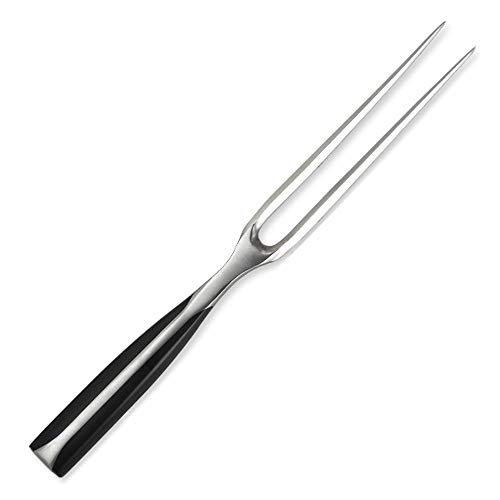What is a carving fork and why is it important?
A carving fork is an essential kitchen tool used for holding meat or poultry steady while you carve it. It typically has two long prongs that securely grip the meat and help you cut even slices. While it may seem like a simple tool, choosing the right weight and length is critical to ensure comfort and control while carving.
What is the recommended weight for a carving fork?
The recommended weight for a carving fork is between 4 and 6 ounces. This weight provides the right amount of balance and control while carving meat or poultry. Lighter forks may not be sturdy enough to hold the meat securely, while heavier forks can cause fatigue and discomfort in your hand and wrist. Most high-quality carving forks fall within this weight range and are made of durable materials such as stainless steel or titanium.
What other factors should you consider when choosing a carving fork?
Aside from weight, there are several other factors to consider when choosing a carving fork. Length is important to ensure you have enough reach to hold and carve the meat comfortably. The tines or prongs should also be sharp enough to easily penetrate the meat and hold it securely without slipping. Additionally, the handle should have a comfortable grip and be made of a non-slip material to ensure safety while in use.
What are some popular brands of carving forks?
Some popular brands of carving forks include Wusthof, Henckels, Shun, Mercer, and Victorinox. These brands offer a variety of options in terms of weight, length, and materials, ensuring you can find the perfect carving fork to suit your needs and budget. Several of these brands also offer carving sets that include a fork and carving knife, making it easy to get everything you need in one set.
What is the best way to care for a carving fork?
To ensure your carving fork lasts for years to come, it’s important to properly care for it. After each use, wash the fork in warm soapy water and dry it immediately. Avoid soaking it in water or putting it in the dishwasher, as this can damage the fork’s material and affect its performance. Store the fork in a dry place, away from other sharp objects that can damage the tines. Additionally, sharpen the tines as needed using a sharpening stone or honing steel to maintain optimal performance.






